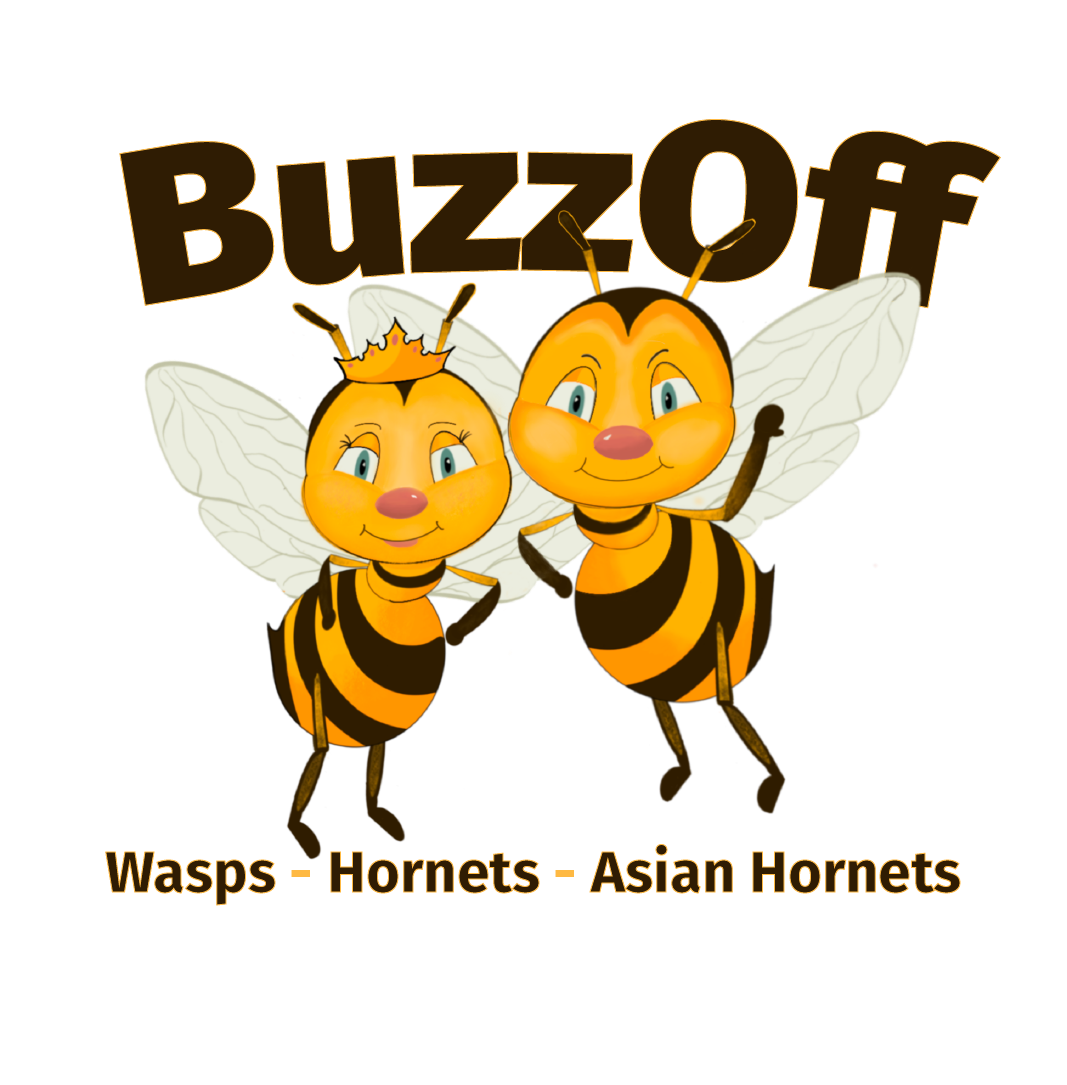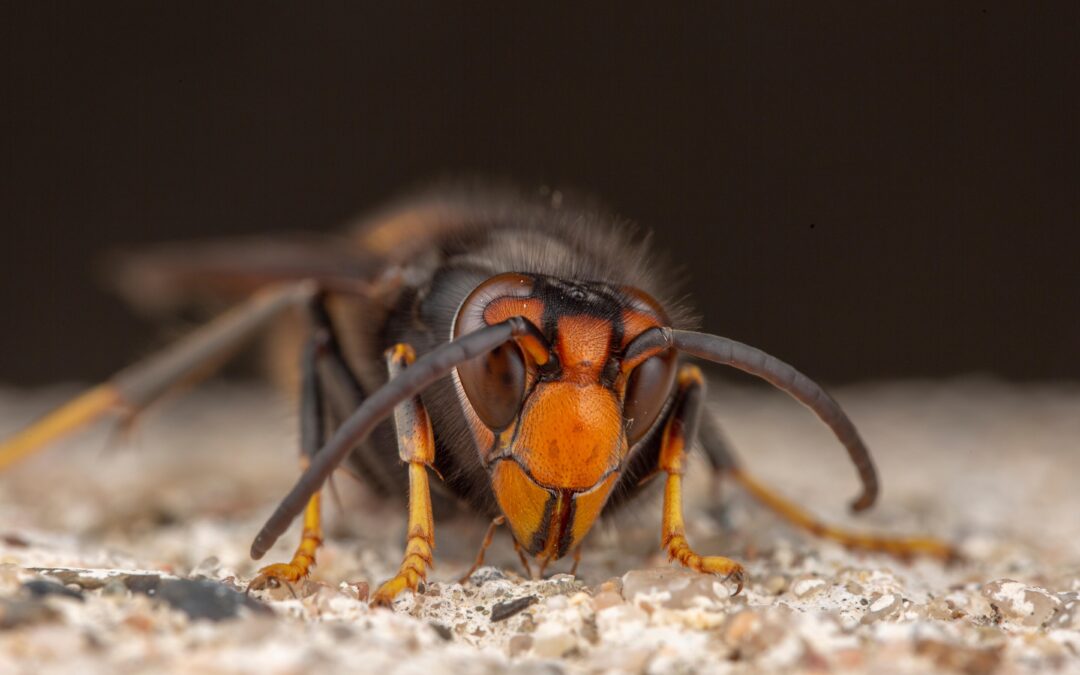It’s completely natural to feel nervous when you spot a wasp, hornet, bee or Asian hornet buzzing around your garden — especially in summer when they’re at their busiest. I used to feel that way before Mike started doing this, and to be honest, before I took up beekeeping myself, I was nervous too. No one wants a sting, and thanks to myths and media coverage, some species have earned an unfairly fearsome reputation.
The truth is, most of these insects are far more interested in their work than in bothering you. In this blog, we’ll explain the typical behaviour of bees, wasps, European hornets and Asian hornets, how they might affect you in the garden, and when it’s time to be cautious and maybe call a pest controller.
🐝 Asian Hornets: The Invasive Threat
Behaviour:
Asian hornets (Vespa velutina nigrithorax), also known as yellow-legged hornets, are an invasive species in France and can be particularly aggressive around their nests. They pose a serious threat to honeybee populations and can be dangerous to humans if disturbed.
In general, their everyday behaviour isn’t dramatically more aggressive than that of a wasp, though those unlucky enough to have been stung may well disagree.
In Your Garden:
Asian hornets often hover around bee hives, forage in trees and shrubs, and seek out sugary food and drink in late summer. They typically build large, round nests high in trees or under roofs, although secondary nests lower down — in sheds, hedges, breeze blocks and even underground are increasingly common.
Their behaviour in France is shifting, largely because they have no natural predator here, and more are being observed closer to homes and populated areas.
How to Identify Them:
-
Slightly smaller than European hornets
-
Bright yellow legs
-
Dark, almost black body with a single yellow/orange band on the abdomen
When to Be Cautious:
Asian hornets will aggressively defend their nest if approached. Their stings can be dangerous, especially if multiple insects attack. Don’t attempt to tackle an Asian hornet nest yourself — it’s essential to contact a certified professional who can safely remove it.
🐝 European Hornets: The Misunderstood Giants
Behaviour:
Despite their large size and loud buzz, European hornets are less aggressive than wasps. They prefer to hunt other insects and generally keep to themselves unless provoked — although, late in the summer, they sometimes get drunk and dopey off fermented fruit and can become much more bothersome.
In Your Garden:
You’ll likely see them at dusk or hear their distinctive hum. They’re attracted to light and may investigate food and drink. They’re not interested in you — they’re simply drawn to warmth and brightness.
If you have fruit trees and leave fallen fruit to rot, you’re far more likely to find yourself with a few of these tipsy visitors, who — though not deliberately aggressive — can sting and be more persistent.
When to Be Cautious:
Like most wasps, hornets will defend their nest if approached. A disturbed colony can be dangerous, so always seek professional help if you suspect a nest in a precarious position.
🐝 Wasps: The Bold Opportunists
Behaviour:
There are many different types of wasps, and most quietly build nests and raise young without much drama. However, as the summer heats up, wasps can become assertive about water sources and sharing outdoor spaces.
The famous wasp’s bad attitude is noticeable in late summer, when natural food becomes scarce and the wasps turn their attention to sugary drinks and human food.
In Your Garden:
You’ll often spot them around bins, picnic tables, drinks, and swimming pools. Wasps are easily aggravated if swatted at or if their nest is threatened.
When to Be Cautious:
A few wasps aren’t usually an issue, but if you are being inundated with them, it may be time to call a pest controller.
🐝 Bees: The Gentle Gardeners
Behaviour:
Bees are peaceful, essential pollinators. They’ll only sting if provoked or if their hive is threatened — and even then, it’s a last resort, because the sting is barbed and will often remain in the skin, causing fatal injury to the bee.
In Your Garden:
Bees move calmly between flowers and plants, gathering pollen and nectar. If one lands on you, it’s likely confused or simply curious.
Interestingly, honeybees won’t cross-pollinate — they’ll stay on the same type of flower on each foraging trip before returning to the hive, which is one of the reasons they’re so important for agriculture.
When to Be Cautious:
Disturbing a bee colony can make them defensive, as can extreme heat. The use of smoke on bees is controversial. The smoke can mask the alarm pheromone, so it can work for the beekeeper to perform inspections without the bees being defensive. Still, others believe it provokes a fear response, due to the smoke mimicking the fire threat, driving them to their honey stores. Bee byproducts like wax and propolis are highly flammable too, so it’s always best to contact a professional or local beekeeper before attempting to handle a situation yourself.
👩🌾 How to Stay Safe in the Garden
-
Don’t swat at them or panic — this can attract more attention. If one lands on you, stay calm and gently blow it away.
-
Keep food and drinks covered when eating outside.
-
Shower or wash hands before going in the pool — sweet perfumes and traces of suncream or fruit can attract insects.
-
Provide water sources away from seating and dining areas.
-
Know who to call — if you suspect a wasp, hornet or Asian hornet nest nearby, contact a professional.
🌿 Final Thoughts
Most stinging insects are simply doing their job in nature’s ecosystem. By understanding their behaviour, you can reduce fear, avoid risk and live more comfortably alongside them.
If you’re ever concerned about wasps, hornets, Asian hornets or bee activity around your home or garden in North Charente, Deux-Sèvres, Vienne or Charente-Maritime, get in touch with us. We’re fully French-qualified, insured, and experienced in termination, safe nest removal, and bee relocation.

